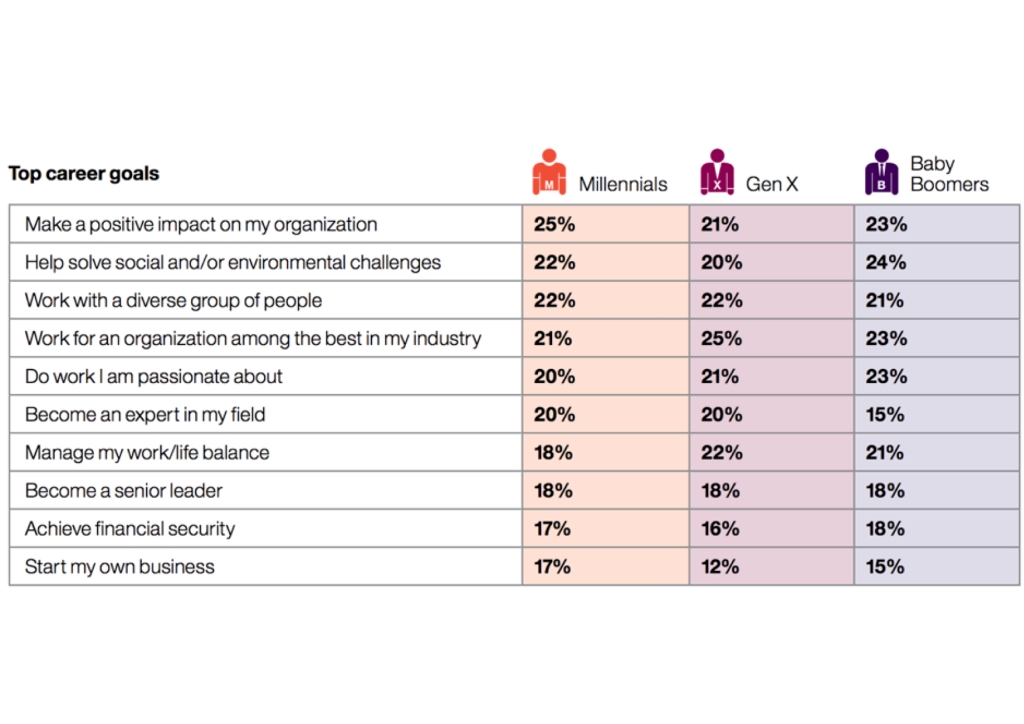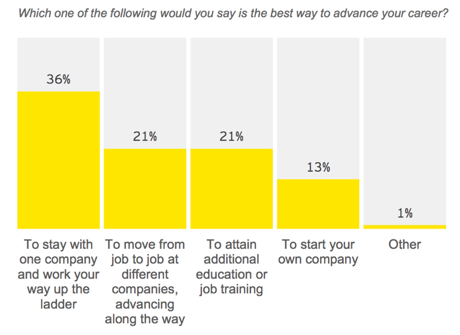
By Dirk Verburg
When reading social media postings, business magazines and consulting firms reports, it is easy to get the impression that the number one problem organizations are wrestling with is incorporating millennials in the workplace. However, there is strong evidence that the orientation of millennials does not differ from previous generations at all.
Who are Millennials?
Most authors agree that millennials are people born between 1980 and 2000. The term millennials originate from Strauss and Howe. In their book ‘Millennials Rising’, they state that people born in this time frame have seven core traits in common that separate them from other generations. These core traits are: being special, sheltered, confident, team-oriented, conventional, pressured, and achieving.
Implications for the workplace
The obvious question is what the implications of these different characteristics are for the workplace. Several studies have been done on this topic, and the following themes emerge:
- Organizations – Organizations need to have a flat structure, provide a team-oriented environment, enable a free flow of information and express social consciousness
- Work – Work content needs to be meaningful, to serve as a creative outlet, to contribute to personal development. Also, having a work-life balance is important
- Management Style – Close relationships with supervisors and immediate feedback are important. This feedback needs to focus on developing strong points, less on areas that need to be developed
Why would millennials be different?
The first question that jumps to mind is why millennials would be different. Aaron Levy(Founder & CEO of Raise The Bar: ‘a firm focused on retaining millennials by empowering managers with training to be better leaders of people’) explains the origin of millennials by stating that they are people who ‘were born and raised with different inciting incidents (9/11), different economic factors (the 2008 market crash) and a different culture (helicopter parenting, car seats and more)’ and were ‘molded as a generation’.
The question is how credible this explanation is. Regarding the ‘inciting incidents’, no one would disagree that 9/11 was an event with a massive impact, however millennials are hardly the first generation that has witnessed dramatic events. Previous generations witnessed World War I, World War II, the murder of John F. Kennedy, the Vietnam war, the Cold War and the fall of the iron curtain, to name but a few. These surely were ‘inciting incidents’ as well.
As far as ‘different economic factors’ are concerned, dramatic as it might have been, the impact of the credit crunch pales in comparison with the economic crisis following the crash of Wall Street in 1929. Furthermore, the gen-X’ers before them have seen a string of other crises since then, including the oil crisis of 1973, the Latin American debt crisis which started in 1982, the Japanese asset price bubble (1986-1992), the 1997 Asian financial crisis and the Internet Bubble starting in 2000.
This means the only factor that could explain the reason why the motivation of a whole generation of potential workers across the Western world is different, would be the upbringing by their parents. This upbringing is often described as ‘helicopter parenting’: over-controlling parents seeking to protect and progress the development and interests of their children, sometimes even during their college education (contacting the academic staff to intervene on behalf of their children) and their entry in the workplace (contacting HR and line managers).
Despite that fact that this difference in parenting style is also the main explanation given by Strauss–Howe, and the fact that there is anecdotal evidence that helicopter parenting is increasing, this does not seem to be a satisfactory explanation.
First of all, it does not explain the sheer scale of the millennial’s phenomenon. It is highly unlikely that globally the parenting style of the vast majority of parents would radically change from one generation to the next.
Secondly, this explanation pre-supposes an extremely strong link between parenting style and the development of individual traits. One of longest running debates in science is the relation between nature and nurture. Explaining a massive change in traits of a whole generation through a different style of parenting suggests the balance in the ‘nature versus nurture’ debate would be heavily shifted in favor of the latter, whilst this is still undecided.
Do millennials require a different workplace than previous generations?
If, despite the reservations one could have, there indeed is a generation coming into the workplace with completely different traits, this would most certainly need to have a measurable effect. There is however strong data to suggest that this is not the case.
- In a study published in the Journal of Business and Psychology by David P. Costanza et.al, it is concluded that ‘…meaningful differences among generations probably do not exist on the work-related variables we examined …’ and ‘Given these results, targeted organizational interventions addressing generational differences may not be effective.’
- A report from IBM’s Institute for Business Value suggests the career goals of millennials seem to be remarkably similar compared to those of Gen X and the Baby Boomers.

- The danger of attrition amongst millennials is also lower than one would expect. According to an E&Y study, the majority of millennials believe loyalty to one company is the best way to advance their career, thereby defying the stereotype of being job-hoppers.

- Finally, research by Kelly Pledger Weeks from Rhodes College in Memphis (Tennessee) indicates that the drive of millennials to want meaningful work is not that different from other generations in the workforce.
Based on this data, the title of an excellent HBR post by Bruce N. Pfau titled ‘What Do Millennials Really Want at Work? The Same Things the Rest of Us Do’, seems to be completely justified.
What is the origin of the millennium hype?
The question is of course why there are so many publications and popular social media poststhat suggest that dealing with millennials is a problem in itself, if there does not appear to be a problem in the first place.
According to the study by Kelly Pledger Weeks mentioned earlier, every generation has stereotypical ideas regarding other generations: they seem to be ‘… only in it for the money, don’t work as hard, and do not care about meaning’.
This lack of understanding translates to a need for support by business leaders in large organizations (ironically, I have never come across a SME struggling with this problem) to attract and onboard millennials in the workplace. Fortunately, for them there is a flourishing consulting industry ready to help company leaders to deal with this issue. A Google search on: ‘helping integrating millennials workforce’ provides more than 1.2 Million hits and typing in ‘consultancy helping integrating millennials workforce’ results in 2.5 Million hits.
So, how do we need to deal with millennials in the workplace?
Given the absence of data to suggest that millennials should be treated differently in the workplace, the best advice seems to be to treat millennials exactly the same as Gen-X’ers and Baby boomers. As Bertrand Russell says: “The young, no doubt, make mistakes; but the old, when they try to think for them, make even greater mistakes.”
Disclaimer: Views, thoughts, and opinions expressed in the text belong solely to the author